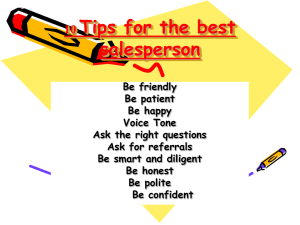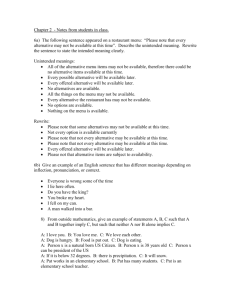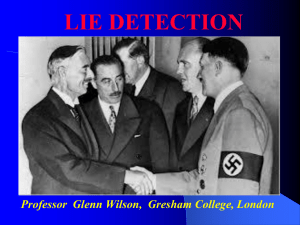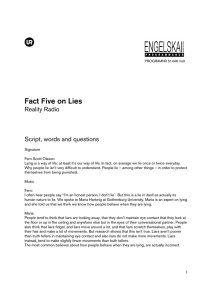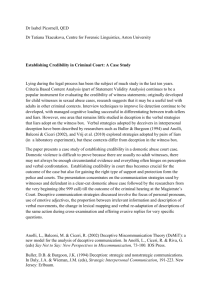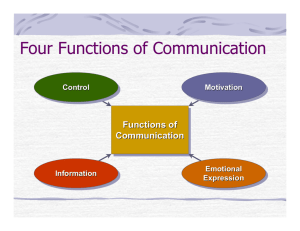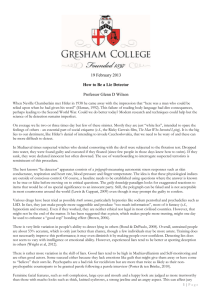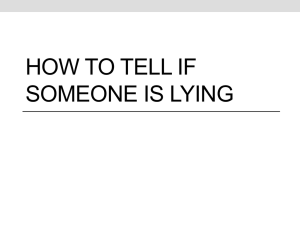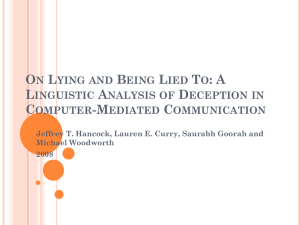Detecting Deception with LIWC Aberdeen, MD April 12, 2006
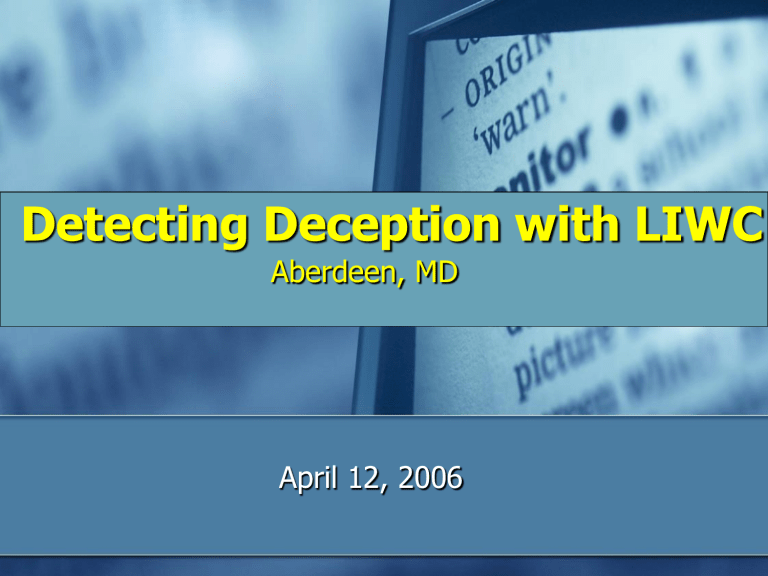
Detecting Deception with LIWC
Aberdeen, MD
April 12, 2006
Experimenters/Collaborators
Jennifer Batka
Emily Beadles
Amanda Brown
Anna Bueno
Emily DeSorrento
Catherine Field
Adrian Gohl
Michael Heller
T. Oliver
Rebecca Pazoureck
Linda Pierce
Angela Price
Rachael Ross
Julie Santiago
Juliana Stewart
Stacie Yoho
Detecting Deception
Reviews of psychological literature on the detection of deception tend to find accuracy rates of between 45% and
60% (cf., DePaulo & Friedman, 1998).
DePaulo et. al (1999) & Ekman et. al (1991) found that those who are highly accurate at detecting deception use various strategies that include both verbal and nonverbal cues of deception.
Newman et al. (2003) found that linguistic analysis may be used to detect deception when discussing emotional topics, like abortion.
LIWC
The LIWC is a computerized text analysis.
LIWC analyzes text word-by-word and categorizes it into 74 different linguistic dimensions, like pronoun, present/past tense, or negations.
LIWC continued…
More detailed examples:
Time Cognitive Process Insight Certainty hour cause think always day know consider never
Space Discrepancy Inclusive Causation around should with because up could include effect
Prior Research
Newman et al. hypothesized (and found) that people use different words when lying than telling the truth
Liars try to distance themselves from the lie
Fewer first person singular pronouns (I, me, my)
Liars use less complex language
Fewer exclusive words (but, except, without)
More motion words (down, up)
Liars are more negative and anxious and this “leaks” into their language
More negative emotional words
Research at Cameron
In a series of studies, we have compared the linguistic style of truthful and deceptive communications from Cameron University students. The studies vary in communication medium and topic; most studies include an additional variable. The studies can be divided into 12 data sets:
Key Differences
Topic Medium
Music
Television
Movies
Movies-new prompt
Health
Physical Fitness
Add. Variable
Talk, Write, Type Importance
Write, Type
Write, Type
Write
Importance
Importance
None
Write, Type
Write, Type
Stress
Activity Level
General Prompt
We would like you to deliver two communications. In one of the communications, we would like you to lie; in the other we want you to tell the truth.
Please write about your preferences for movies.
For example, you should identify your three most favorite movies and your three least favorite movies. Mention both old and new movies that you especially like or dislike.
Feel free to name actors that you feel strongly about.
Include the type of movies you especially like and dislike.
Be sure to make your communication persuasive.
Try to make your listener believe that you are telling the truth (even if you are not). You can type as little or as much as you want.
Questionnaire
Participants complete a questionnaire to determine the importance of the topic in their lives.
A median-split is used to identify whether or not the topic is important to each participant.
Other questions assess their feelings as they delivered the two communications.
Questionnaire Results
T-tests are performed to compare responses to the questionnaire items with the scale’s midpoint
Participants report the following when they write truthful vs. deceptive statements:
Feel more comfortable
Believe they type more quickly
Indicate they have more fun while writing
Feel less negative
Feel less anxious
Believe they type more words
Linguistic Analysis
Typed communications are copied into a text file
Text files are submitted to the Linguistic Inquiry
Word Count (LIWC)
ANOVAs are performed with independent variables
Importance of Topic: high or low (between)
Topic: movies or TV (between)
Communication Medium: write or type (between)
Communication Type: lie or truth (within)
Dependent Variables: Use of linguistic categories
Results
Main effects are often found for all independent variables and several interactions are often found. For example…
Causation Words:
Importance X Lie or Truth Communication
1.8
1.6
1.4
1.2
1
0.8
0.6
0.4
0.2
0
True
Lie
High
Importance
Low
Inclusive Words:
Topic X Lie or Truth Communication
7.4
7.2
7
6.8
6.6
6.4
6.2
6
5.8
True
Lie
Movies
Topic
TV
0.9
1
0.8
0.7
0.6
0.5
0.4
0.3
0.2
0.1
0
Optimistic Words:
3-Way Interaction
Topic is of High
Importance
Topic is of Low
Importance
True
Lie
0.9
1
0.8
0.7
0.6
0.5
0.4
0.3
0.2
0.1
0
Movies TV Movies TV
True
Lie
Individual t-tests
Dependent t-tests to compare deceptive and truthful communications were performed separately for the 12 data sets.
Only four linguistic categories had similar results in more than one study.
Distance Self from Lie
Newman et al. found people used fewer first person singular pronouns when lying than telling the truth.
We found this in the Movies-Type data set and the opposite finding in the Health-Write data set.
Other pronouns:
Liars used more first person pronouns in Health-Write
Liars used fewer pronouns referring to self in the Movies-
Type data set
Liars used fewer second person pronouns in the Movies-
Type data set
Language Complexity
Newman et al. found people used less complex language when lying than telling the truth
Liars more than truth-tellers used:
Negate words in Health-Type, Fitness-Write, and Movies-Write
Certainty words in Health-Type and Music-Type
Numbers for Health-Write but liars used FEWER numbers than truthtellers in Movies-Write
Liars were less likely than truth-tellers to use:
Discrepancy words in Fitness-Write
Inclusive words in Movies-Type
Words with six or more letters in TV-Write
But, liars used more exclusive words in Music-Type and more insight words than truth tellers in TV-Write
Expressions of Emotion
Newman et al. found people were more negative and anxious when lying than telling the truth
Liars more than truth-tellers used
Anger words in Movies-Write
Negative emotion words in Music-Write
Anxiety words in Health-Type under normal stress levels but liars used fewer anxiety words in TV-Type
Liars were less likely than truth-tellers to use
Positive feeling words in Movies-Write-New Prompt, Movies-Write,
Music-Talk
Positive emotion words in Movies-Type and Music-Talk
Liars used fewer affect words in Music-Talk and more emotion words in Health-Write under moderate stress
Other Findings
Liars used the past tense less often than truthtellers for Fitness-Type and Health-Write under moderate and major stress, but used it more for
Health-Write normal stress
Liars were less likely than truth-tellers to use the following words:
Cognitive Mechanism words in Fitness-Write
Inhibition words in Movies-Write-New Prompt
Communication words in Music-Write
Achieve words in Music-Write
Liars used fewer words than truth-tellers in Music-
Type
Limitations
Convenience sample
No rewards for telling truth or punishment for getting caught lying
Participants may see lying as helping the experimenter
The prompts may include demand characteristics
